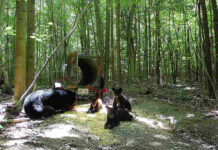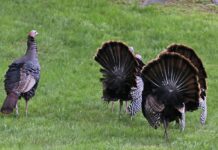I hope you enjoy this little Thanksgiving story.
In the November 1928 issue of The American Thresherman magazine “Aunt Malinda,” a column that was written by M. Belle Clarke, the wife of the publisher, Bascome B. Clarke, wrote of a recent Thanksgiving with she and “Uncle Silas.”
Aunt Malinda had proposed inviting their whole family for a Thanksgiving dinner of turkey and all the trimmings.
Silas replied, “Why, a real turkey, fresh from cold storage is sixty cents a pound and the Lord knows how much it is fresh from the roost. We’d better be content with a goose or a mud hen or a rabbit for offerin’ a morsel of prayer over, in keepin’ with the ways of our forefathers?”
“We’ll do nothin’ of the kind,” I says. “We’ll return thanks over a real turkey, with cranberry sauce, escalloped oysters, pumpkin pie and all the other trimmin’s.”
After he got home from the office on the night before Thanksgiving he asked, “Malinda, are we goin’ to eat mud hens tomorrow?”
“No,” I says, “we are not goin’ to eat mud hens. But I was expectin’ your son from Michigan and his tribe and just got word that they can’t come so we’ll invite in an orphan or two from the university to help out on the spread.”
“Say,” he says, “don’t you know those university boys all eat like they had a tapeworm?”
“I don’t care how much they eat,” I says, “and all I ask of you is that you come home from the office tomorrow in time to tell the Lord that we’re grateful to the threshermen, their families and the manufacturers who help decorate the mahogany.”
For Thanksgiving Silas was treating his employees at the paper to a breakfast of “Gordania” sausage, “which J. Roy Gordon affirms under the pains and penalties of perjury, is made entirely of little pig meat without the ears and toes included,” and which Silas called “real sausage.”
After this breakfast, Silas “had to get his whiskers planed before the shops closed.”
Aunt M. goes on, “After Silas had scattered thirty pounds of sausage among the faithful and had started for the barber shop, he met a bright-eyed farmer boy who asked him if he wouldn’t stake him to a few bites to eat.
“Silas stopped and gave him the once over and says, ‘Son, you couldn’t make a tramp of yourself if you tried, but tell me honestly, How come?’ And, he looked him right in the eyes.
“It’s a little difficult to skate on thin ice while relatin’ facts to Silas, who said to me afterwards: ‘Malinda, God sent that hungry boy to me. I asked how long it had been since he’d properly nourished the inner man. ‘Well,’ said the boy, ‘I hate to beg but I’m almost starved. Yesterday mornin’ a restaurant man gave me a bowl of soup and a bun in return for scrubbin’ out his place.
‘That’s the last time I had anythin’ to eat’ says he.
‘That was a liberal-hearted restaurant keeper,’ Silas ‘lowed.”
“Then he took the homeless boy back to the office, slipped him a dollar and street car fare, called the Volunteers, to whom Silas had given their home and barracks when he was more flush than he is now, askin’ for a night’s lodgin’ for the boy, and was told that they would include Thanksgivin’ dinner also.
“The boy told Silas, in answer to the question as to where he proposed to sleep that night, that he’d thought of the police station, but Silas told him, ‘Not in a hundred years. When the sleddin’ was easy for me I provided a home for just such cases as yours.”
And that’s when he called the volunteers. Later Silas tells his wife, “’Malinda,’ he says, ‘it reminded me of that other poor unfortunate tramp that almost ate us out of house and home ‘way back in Colfax. Somehow,’ he says.
‘The Lord knows where to send the sheep when they’re in need of shelter and I thank God for the opportunity of helpin’ such a clean-lookin’ farmer boy that flew in my window yesterday.
‘I told him,’ says Silas. ‘That he didn’t have anythin’ on me for I was poorer than Job’s turkey when I was an orphan boy (Clarke had lost his parents in Arkansas during the Civil War).
I told him how old sainted Mother Noble back there in Indiana, who is now eatin’ manna with the angels, fed me hot mince pie when Old Smith brought me from the South with a herd of refugees, back in ’64.’
Aunt Malinda winds up her story with this, “Well, we had turkey and all the fixin’s and when Silas wondered about the mud hens I told him I’d feed him mud hens for Christmas if he kept talkin’ about the high cost of livin’ when we had company.”
In these days of three-day holidays and, in the case of Thanksgiving, four days, it’s difficult to imagine those days ninety years ago when business offices and even barber shops were open on Thanksgiving morning.
Times have sure changed.
Happy Thanksgiving and say “Thanks” to a veteran.













